#so idk maybe someone who transitions further in adulthood might be uncomfortable with their head tatts
Text
Shigaraki • Development
Backstory
(Note: Tenko was Shigaraki’s childhood name.)

First things first: Shigaraki’s backstory is probably meant as an allegory. The house his father built is a microcosm of society, his father Kotaro represents people with power, Tenko represents people without it, and the other family members are bystanders. The power imbalance and communal emphasis on harmony enables Kotaro to take out his baggage on Tenko while Tenko is required to repress his. Resistance, even if it’s minor, causes Tenko to be shunned and beggared, as Kotaro locks Tenko out of the house in the backyard, in the dark, unfed, without even a roof over his head.
Edit: @codenamesazanka has an excellent reading of this allegory!
Theirs is a household that prioritizes unity and a façade of happy domesticity over Tenko’s wellbeing. His mom and grandparents treat him gently, reject him kindly, and refuse to admit to him just how terribly Kotaro treats him. Though the three adults understand that Kotaro is the problem (they criticize him in private or cry out futile protests during an incident), they are unwilling to disrespect Kotaro to Tenko’s face. Doing so would mean facing their victim and owning up to their own culpability, too.
So, throughout Shigaraki’s backstory, Horikoshi intersperses black panels with increasing grains of white. This references Shigaraki’s “wound in his heart.”
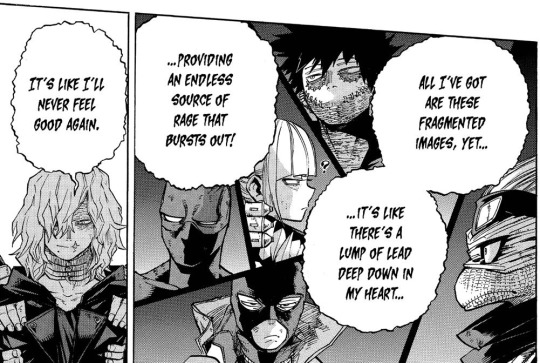
The first black panel appears when Tenko is crying to his mom, Nao, about his dad; the second appears when he is similarly comforted by his grandparents.
After an episode with Kotaro, Nao hesitantly asks Tenko if he still wants to be a hero.
Nao: “Tenko…do you…still want to be a hero?”
Tenko: “Yup. Because like, nobody wanted to play with Mikkun and Tomo. So I said, ‘Let’s play together!’ And we played heroes, and it was super fun. And then Mikkun said, ‘You should be All Might, Ten.’ And I was nice and played with them even though they don’t have any friends.”
It’s hard to follow Tenko’s five-year-old’s logic here, but the gist seems like Tenko wants to be a good person who makes people less lonely, and he thinks heroes do that. The implication, then, could be that Tenko is lonely, and his admiration for heroes compensates for what’s missing in his family (a hero).
What’s also significant is that Tenko noticed Mikkun and Tomo were suffering, and instead of ignoring it or playing along like everyone else, he did something about it. What he emphasizes isn’t, “we played heroes and fought bad guys, it was really cool”; he emphasizes that he was kind, that he helped kids who were lonely. This isn’t a kid who wants to be a hero because heroes are strong.
Also worth noting that in bnha, p much every kid wants to be a hero. By forbidding Tenko from even playing, Kotaro draws a line between Tenko and his classmates: Tenko is not one of them. He’s not allowed to dream he’ll be a hero like everyone else. In a society overflowing with heroes (and with adulation of heroes), Tenko can’t be one of them nor admire them.

^^ the first “wound” panel is the black middle one
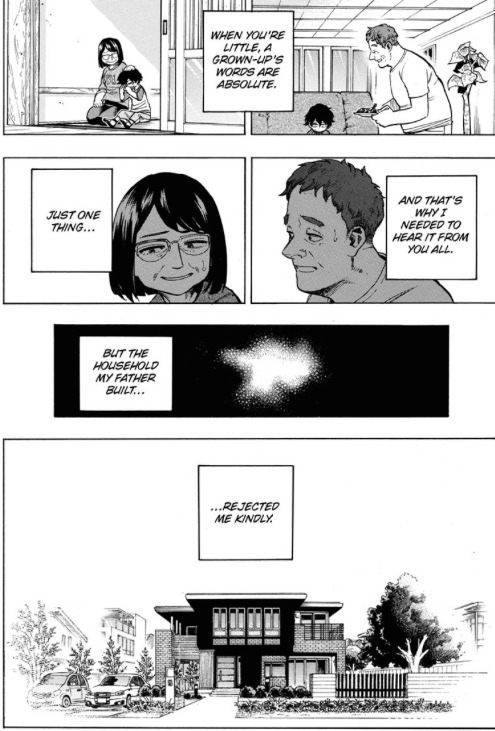
When Nao tells Tenko that “it’s hard to be a hero,” especially right after hesitantly asking him if he still wanted to be one, Tenko understands that she’s discouraging him—similar to how Inko apologized to little Deku when he asked her if he could become a hero without a quirk.
When Nao tells Tenko it’s difficult, she’s essentially repeating what Kotaro says (“being a hero will cause him nothing but trouble”). By siding with Kotaro, she tells Tenko that he can’t become who he wants to be. He must conform to authority and let Kotaro determine his life. What he wants and feels don’t matter. Kotaro is right.
The wound begins to open.
Similarly, his grandparents offer him empty comfort because they, too, believe in presenting a unified front. The kids aren’t allowed to be aware that there’s conflict between the grown-ups: rules are rules, instructions from your seniors are absolute, social harmony (and by extension, social hierarchy) has to be maintained. Tenko himself is the troublesome one—he’s the one who needs to be comforted, who keeps breaking rules, who can’t pretend everything is okay the same way everyone else can.
The wound opens further.
The initial wound and its exacerbation are both brought on by his mom and grandparents, not by Kotaro directly. Why? Because it’s the permissiveness of the adults that socializes Tenko in how to react to Kotaro. Kotaro’s abuse is too much for a five-year-old to process, so he trusts the other grown-ups in his life to understand it and tell him how to feel about it/what to do about it.
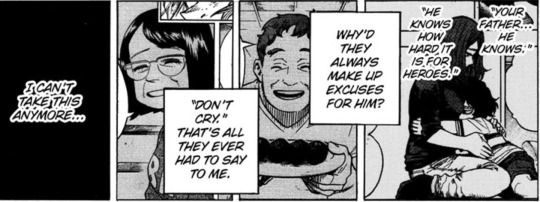
What they tell Tenko, implicitly, is that his pain doesn’t matter enough to do anything about, and it’s his fault it exists. Underneath, he recognizes this and resents them for it. They might not actively participate in Kotaro’s abuse, but they actively support him by trying to wipe away the consequences without any accountability for the problems. They shift blame to other people (Kotaro, Tenko) without owning up to their own role in the proceedings, so that they can pretend life is good and think of themselves as good people who don’t make trouble.
Tenko has a related “wound” associated directly with Kotaro.
((When Kotaro approaches Tenko to begin smacking him…))

The “itch.”
Tenko is five years old, and kids that young aren’t known for their emotional intelligence. This is his little-kid way of trying to describe his negative emotions: agitation, anguish, panic, frustration, aggression, resentment, desperation, (thwarted) hope, and so on.
Tenko scratches himself frantically because he doesn’t know how else to react to the things he’s feeling, and he doesn’t know how else to react because nobody is trying to help him sort through them. He’s only been told to suppress them. Plus, in adulthood, Shigaraki scratches himself when he’s stressed about something, so it makes sense for this ~allergy~ to be the origin.
I dunno why Tenko fixates on his face—his eyes, specifically…maybe out of shame? maybe because his face and eyes are what express his uncomfortable feelings, and/or because his eyes are what he uses to fruitlessly beg for help? or maybe the eyes out of a desire for blindness, to not see what’s in front of him the way everybody else pretends not to see?

(The irony, ofc, is that Kotaro is accusing Tenko of wanting to hurt their family, when in fact Kotaro is the one hurting their family.
Judging by how Nao and her parents approach Kotaro after the fact and tell him that they will leave if he hits the children again, I don’t think it was common for Kotaro to smack Tenko like this.
Also, this is the first time Tenko is shown scratching his neck: when his thoughts are crying out, help me!)
Tenko isn’t begging mercy from Kotaro, which says leagues about their relationship. Instead, he’s begging for interference from the rest of the family, for someone to stand up for him, to challenge the public humiliation Tenko regularly endures as Kotaro’s scapegoat. Nobody does, of course, like always.
It takes a few hours, locked out of the house, for the trauma to set in.

The wound gets worse…but this time it’s different.
For one, it’s accompanied by dialogue, not narration, and “everyone” is centered right in the core of his rage. The second (iffier) difference is that this time the wound and the itch coincide. In the previous situations, he’s either scratching himself or the wound is deepening. This is the first time Horikoshi depicts the two occurring simultaneously, and it’s this moment that his quirk fully awakens.
Tenko kills his dog and begins to have a panic attack. His emotions are choking him; the only way he can ask for help is to reach out to his sister, finally, in the way he didn’t dare to reach out while Kotaro was smacking him.

I’ve seen people suggest his voice fails as a side-effect of his quirk, but I think it’s trauma-related, not physical. For one, he still describes it as an “itch,” and for two, once he processes his trauma and decides that killing his family wasn’t a tragedy, Shigaraki’s characteristic squiggly speech bubbles are replaced by average speech bubbles.

This is consistent, so, his vocal problem was solved emotionally. So maybe his quirk was reacting to his emotions and placing pressure on his vocal chords? But idk, seems to me it was a psychosomatic problem.
Either way, he kills his sister as she runs away, and her scream attracts his mom and grandparents.
Then comes the fourth panel.
(For context, the narration refers to how his negative feelings towards his mom and grandparents accumulated.)
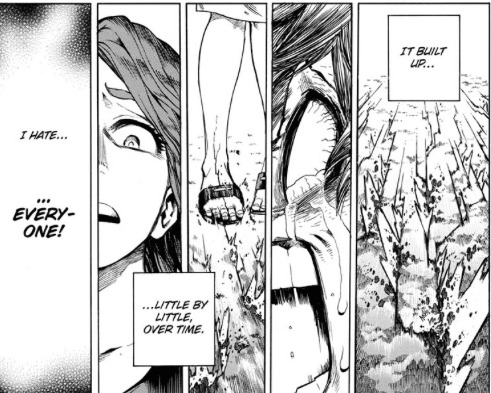
The whiteness is gushing forth, and it surges when Tenko sees his mom staring at him with terror, unable to summon a reassuring smile or any words of comfort for him.
The noises catch Kotaro’s attention. He pokes his head into the hall and walks through the empty house until he spots the open door to the backyard.
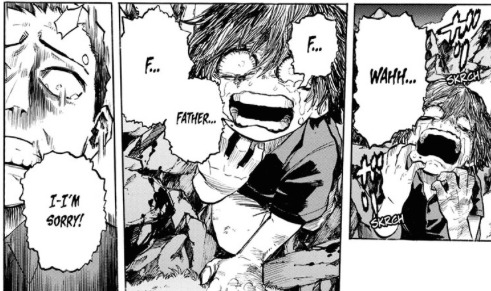
(Tenko has now transitioned to mainly scratching his neck instead of his face.)

Tenko reaches out to someone for the final time, and his (deadly) hand is rejected—smashed away, really.
Kotaro’s life is in danger, he’s shocked by the deaths of his family, he panics, and he reacts cruelly.
The tipping point is what happens afterwards.
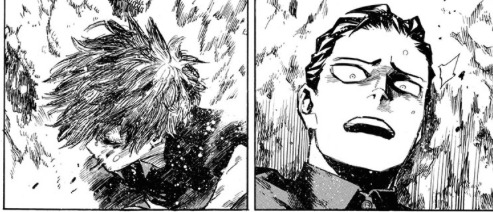
Kotaro is surprised and horrified by what he’s done. But, like always, he stubbornly refuses to acknowledge to Tenko his wrongdoing. Instead, he reacts by doubling down and asserting his authority.

“Mommy, why does Father say no all the time? Does he hate me?!”
I’m not sure quite what Kotaro is doing here. At first I thought he was smacking Tenko, the way he did earlier that day, but that blob in the lower right panel is part of the background, not his hand in motion. So instead, it looks like Kotaro is holding out his hand in a “stop, stand back, stay away from me” gesture, or maybe to literally push Tenko away. (Have to wait on the anime, I guess.)
Regardless, Kotaro tells Tenko “no” for the last time. The immediate blame, the dearth of kindness or sympathy, the reaching out to him—someone’s trying to save him!—only to deny him…it evokes their history. Tenko is already in the midst of a meltdown, and now he snaps.
I hate bringing up real-world examples when thinking about stuff like bnha, so I hope this will be the only time I ever do it, but I’m powerfully reminded of a gun violence incident in Mississippi where a nine-year-old kid and his thirteen-year-old sister got into an argument over a video game controller, and the boy retrieved their parents’ gun from another room and shot her.
It’s ludicrous to think he had any meaningful concept of what he was doing, and, regardless of how Shigaraki interprets his past, the same holds for Tenko. Just because Tenko had a good “reason” to want Kotaro dead doesn’t imply he had a meaningful grasp of what he was doing. He killed Kotaro because he was a kid with access to a deadly weapon, and there’s a reason kids aren’t trusted with those.
But it is meaningful that Shigaraki struggles to make the distinction between aggression and murderous intent. AfO deliberately trains Shigaraki to adopt this warped mindset by telling him that his bad feelings, his “itch,” are equivalent to bloodlust. Realistically, there’re plenty of ways to relieve negative emotion, but Shigaraki has been taught exactly one outlet: destruction. So, he doesn’t realize that his murderousness is a product of nurture, not nature. (Also, lol, “murderousness” is a real word!)
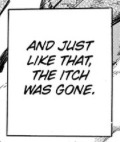
Anyways, for the first time, Tenko experiences catharsis for the negative emotions that have built up his whole life. A fluke of fate enabled him to subvert the established power dynamic, and the destruction of the house encapsulates the collapse of their family’s hierarchy. He still doesn’t understand what he’s done.
By the next morning, it’s begun to sink in. He ran away from the house and then wanders the streets, too consumed by guilt to speak, and he’s ignored by everyone. When someone finally pays attention and seems willing to help him…
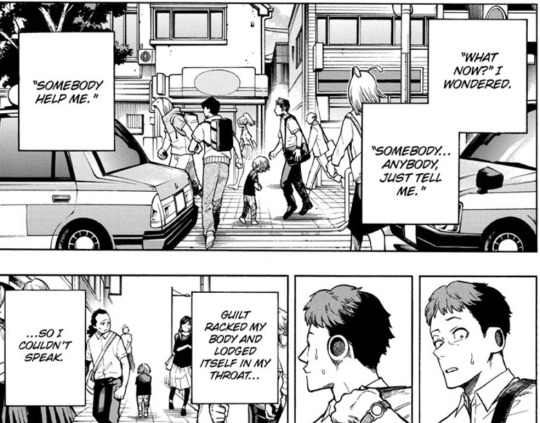

He smiles, happy that someone is finally going to help him. But his dirty, creepy smile scares the old lady off.

(reminds me of his early design.)
To him, it’s like people can see what he’s done, and that’s why nobody will help him or even acknowledge him. Notice the lower left corner: the blackness and white grains, spilling over from his wound.
The itch returns, and the scratching and the wound overlap again. It’s hard to say whether the wound is reacting to the old lady in general, or if it’s tied to the narration line “being punished.”
It occurs when Tenko simultaneously wants to be saved but also thinks he doesn’t deserve it, that everyone can see how bad he is and knows he doesn’t deserve help.
What did Shigaraki learn from this?
Social harmony is forged by repressing conflict, not by resolving it. This happens at his expense, purposefully.
“This is the house my father built.” Creation, construction, building, making walls, making rules, making—these are bad, and they’re performed by the people with authority and power. These things happen for other people, not for his sake.
He’s not important enough to be helped / not worthy of it, and he resents that.
Origin of his self-loathing.
Other notes:
The “itch” is something he can find temporary catharsis for (through violence), and Shigaraki thinks the itch might have gone away if someone had just helped him. The “wound” is not something that ever alleviates or that he suggests could have gone away.
The wound’s origin is from the complicity of his family to Kotaro, not from Kotaro himself.
It’s interesting that his dream to destroy society is a reenactment of his destruction of his family/house, even though killing “everyone” the first time devastated him.
He switched from mostly scratching his face to mostly scratching his throat.
Both these are sites where emotion is expressed.
Hands are another site of expression, and he later develops his fascination with his family’s hands and uses his own hands for destruction.
Activating decay seems to have hugely worsened the scarring around his eyes. He says that he thought the “itch” had gone away, so it’s unlikely he was scratching himself overnight…so I think his quirk had the side-effect of exacerbating his scars? If decay made the skin around his eyes hurt, that could relate to why he switched to mostly scratching his throat.
Even as a kid, Tenko had a certain amount of pride/dignity, enough to blame others for mistreating him instead of blaming purely himself.
Tenko admired heroes partly because his family lacked one, but when he discovers Nana…? Now someone inside the family (inside the house) was a hero, so the rules were different than what he thought?
Upbringing by AfO

When Tenko killed “everyone,” that included himself. All that’s left of him afterwards is an empty shell. He doesn’t even seem to remember what he’s done.
But AfO is willing to extend a hand and touch Tenko.
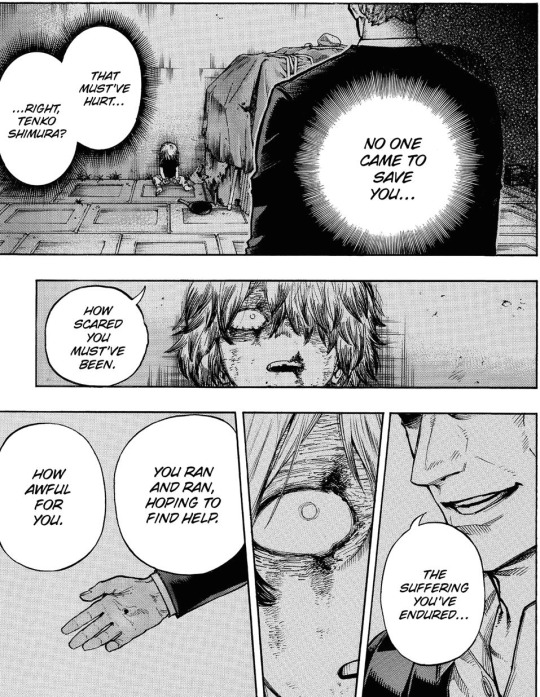
He’s willing to acknowledge Tenko’s pain, something nobody else was or is, at the moment in his life when Tenko feels he least deserves sympathy.
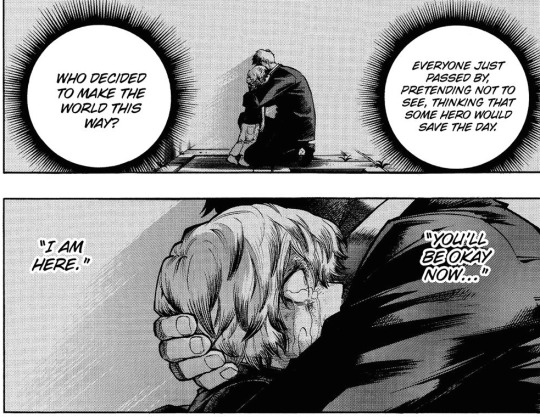
Now, obviously it’s hella suspicious that AfO already knows Tenko’s name, knows what he’s done, and procures his family’s hands, but Shigaraki doesn’t seem to question it. Tenko’s arms dangle there, limp, as AfO embraces him and tears stream down his face. And, ofc, AfO echoes All Might’s motto.
AfO takes Tenko in and tells him he’ll be his master from now on. Then…
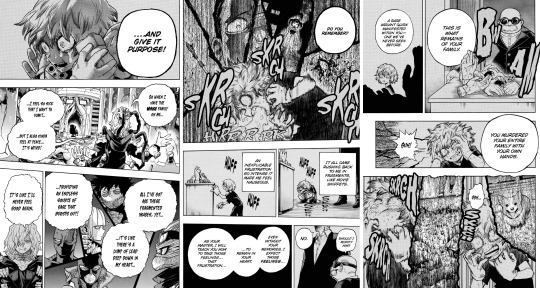
Tenko viscerally remembers what he’s done, and his immediate reaction is to scratch himself, puke, and then seize the severed hands, gathering them up and cradling them close to him. It’s probably then that Tenko discovers the feeling that Shigaraki describes—of feeling violently ill but somehow at peace, too. (“When a person’s life starts spiraling, what’s the one thing they want? Comfort.”) There’s way too much to unpack here, so, moving on.
The “purpose” that AfO alludes to is the destruction of society/the status quo.
While Tenko is huddled on the ground, cradling the hands, AfO continues.

AfO’s the first person willing to talk to him about his itch as emotional instead of as an allergy. He tells Tenko point-blank that he cannot control his impulses and that his release must take the form of destruction.
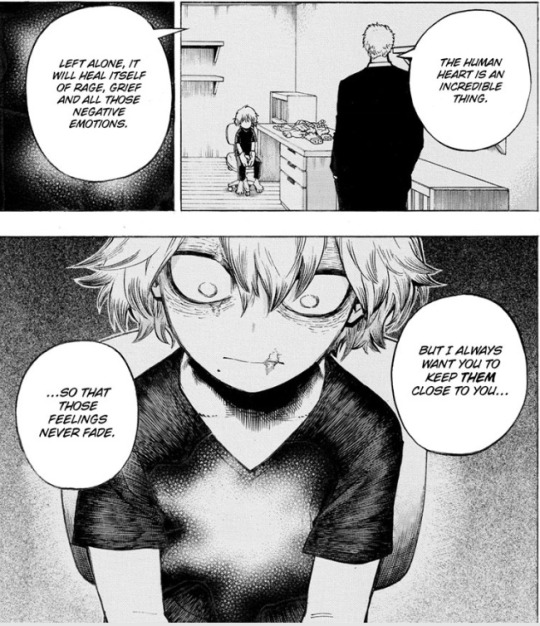
This moment baffles me. AfO openly admits that Tenko’s feelings will fade…if left be. As far as we see, he doesn’t explain to Tenko why it’s important that those feelings never fade, why emptying himself of his pain is a bad thing. But even after being told time would heal him, Tenko keeps the hands close to him—and I don’t think he was just doing what AfO wanted.
This panel is also interesting because it definitely makes it look like Tenko’s wound is glowing, like it’s a light in the dark. Also, AfO’s dialogue nearly obscures the early panel of the wound…hm.
Regardless, AfO implies that those feelings are the most important thing Tenko has, and he should keep them close. It’s not specified if AfO told him to wear his family.
Later, Tenko’s wandering on the streets (his hands aren’t with him) when he encounters a duo of thugs, who beat and mock him. At first, Tenko lurches to fight back, but…

I think these are more “wound” panels: the blackness with white grains. He backs down, even though his rage doesn’t dissipate.
When he returns home, AfO encourages him to embrace his feelings instead of holding them back. Tenko literally writhes on the floor from the force of his “itch,” going all out as he wallows in his overwhelming feelings.
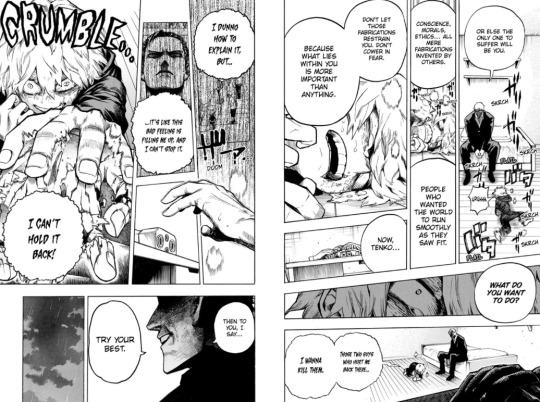
AfO tells Tenko that ethics were invented in order to suppress people and that Tenko’s emotions are more important than anything else. Tenko responds by reiterating what AfO told him: he wants to destroy those thugs, and he can’t control this urge to destroy. He goes as far as to disintegrate one of Kotaro’s hands, even though not too long ago he clung onto it.
But, later, he wears his family’s hands for the first time.
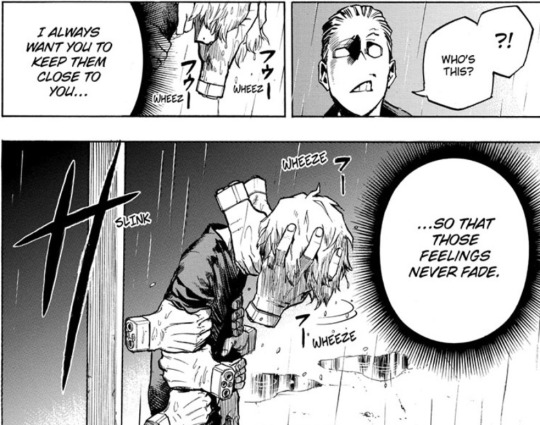
Wearing them clearly affects Tenko adversely—he’s struggling to breathe properly, and he’s entirely slumped over. But these hands, and these feelings, are the only things he has left, the only things he knows, and he won’t leave them behind.
He encounters the same duo of thugs and kills them.

His wound again. Formless, but with a sense of shifting and movement. Undiminished, even if the itch is alleviated. Or, maybe this panel is supposed to indicate a deterioration, like the wound gets even worse after the murders?
Observing the event, Ujiko remarks that he’d thought Tenko had lost his memories. I think he’s commenting on how Tenko is wearing the hands despite not remembering who they’re from?
AfO comments…

Tenko restrains quirk subconsciously, limiting its disintegration to just what he’s directly touching, which makes it seem like he’s afraid of his quirk and feels guilt/self-loathing for it. He’s aware that his quirk is connected to the things he feels, maybe even blames his quirk in some way for making him feel this way.


It’s ironic that Tenko feels free while he’s being throttled and restrained by the hands of his relatives.
lol AfO gives away the game a bit, here. He tells Tenko to do whatever he wants and not hold back, and then praises Tenko for “holding back” his tears. He just wants Tenko to have no way to vent his feelings except violence. Also, the fact that Tenko is “holding back” his quirk…hmm.
Again, too much here to unpack rn, so, moving on.
AfO gives Tenko the hands of the thugs he killed, plus one hand of unknown origin to replace the hand of Kotaro’s that Tenko destroyed. Shigaraki describes the gift as soothing to his battered body, and he felt reborn. AfO gives him the name Shigaraki Tomura ad implicitly positions himself as Shigaraki’s dad by telling Shigaraki that “Shigaraki” is his surname.
What did Shigaraki learn from this?
Morals are illusionary, merely a tool used to suppress people without power in order to make things easier for people who do have power.
His “itch” means bloodlust, and he can’t control it.
He should just do what he wants (except crying, apparently), or else he’ll just suffer indefinitely.
Rejection of a society he had no hand in making and no place to belong in.
Other notes:
Even without remembering his aggression towards Kotaro, it’s Kotaro’s hand he shows the biggest fixation on.
Shigaraki has three “ailments”: the itch (the agitation he feels from bad things), the wound (the “rage” and “frustration” he feels from bystander apathy), and the nausea he feels when he wears the hands (self-loathing?).
Or maybe the nausea is part of the wound?
More on the wound?
I wonder when Horikoshi decided on how to visualize Shigaraki’s pain, and if he uses it as a pattern in bnha.
I’ve noticed a few panels that remind me of Shigaraki’s wound, especially that amorphous panel after he kills those thugs, but it’s hard to tell if the backgrounds are just atmospheric or if there is actually an attempt to connect these moments thematically.
Here are a few that I noticed.
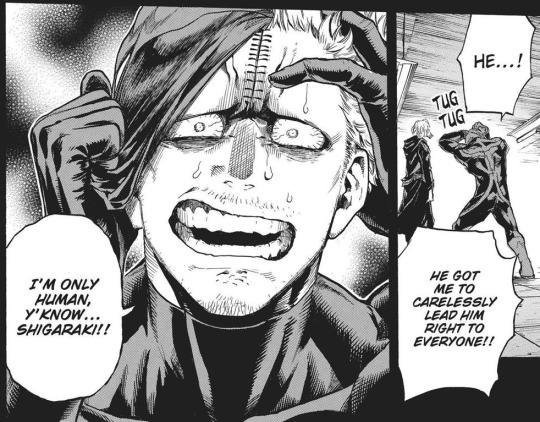
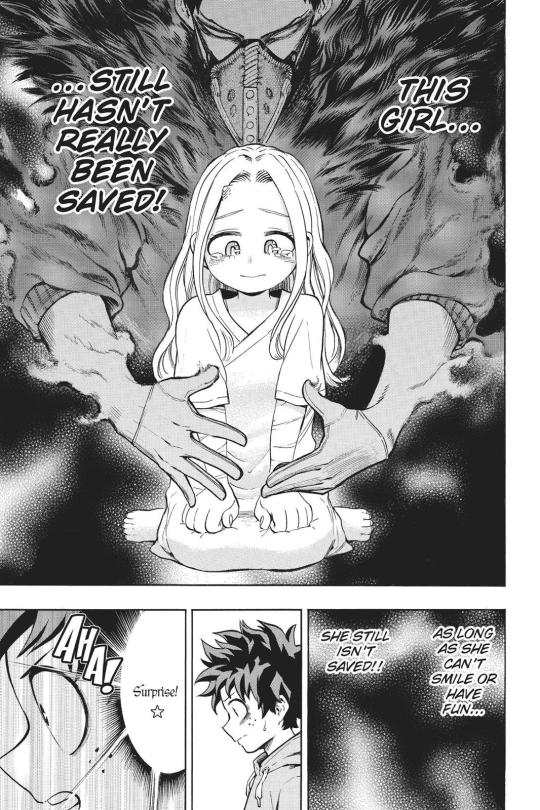

I’m going to keep an eye out ¯\_(ツ)_/¯
Edit: here’s another one. This is the most definite example so far: it occurs in ch250, post-Shigaraki’s flashbacks, and the distinct circle doesn’t produce an atmosphere the way the previous ^^ panels do.
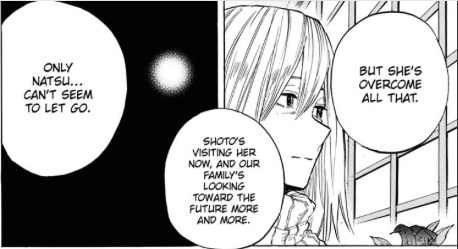
^^ it’s worth mentioning that this appears during Fuyumi’s narration, detailing how Natsuo is the only one in the family who can’t move forward, ie, he’s experiencing social pressure to conform and validate Endeavor similar to how Tenko felt pressure to conform to Kotaro’s authority.
And then this next one, I’m pretty unsure about, but I’ll include it in case:
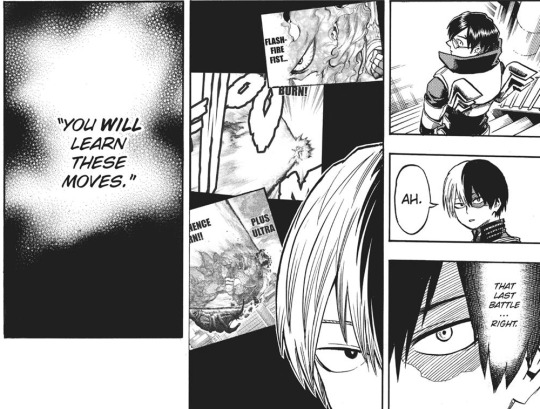
#bnha#bnha meta#shigaraki tomura#shigaraki development#this is mostly me like…summarizing what happened with a bit of active analysis#sorry that the tone is so weird#I wrote this as ref material for myself bc I was sick of jumping between chapters trying to put things in chronological order#and I needed to organize my thoughts on stuff#though I got tired by the end#maybe I'll update it when I feel re-inspired#but anyways here it is if anybody else wants it#bnha manga spoilers#mla arc#no.13
234 notes
·
View notes